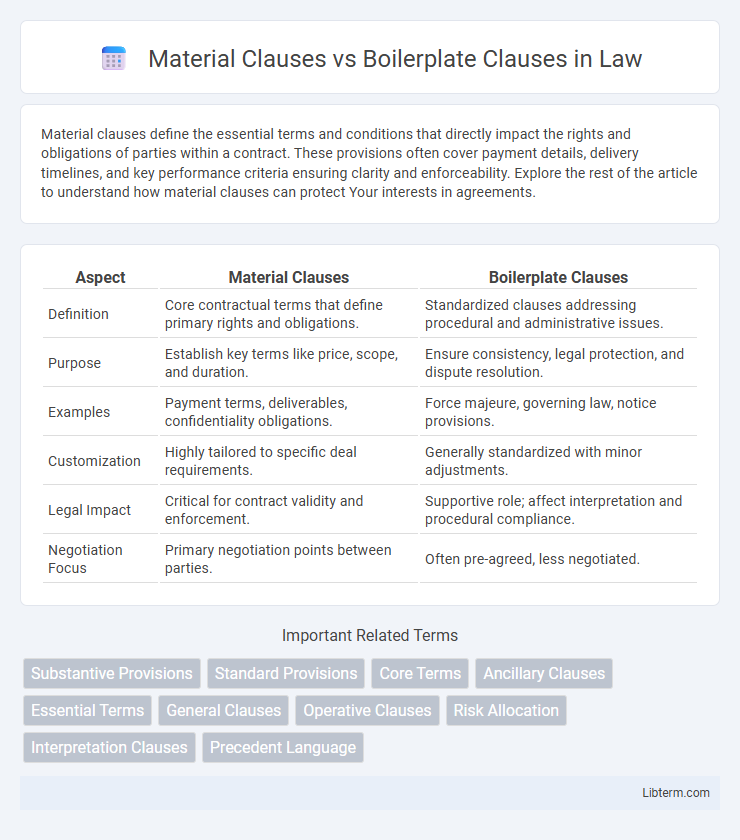Material clauses define the essential terms and conditions that directly impact the rights and obligations of parties within a contract. These provisions often cover payment details, delivery timelines, and key performance criteria ensuring clarity and enforceability. Explore the rest of the article to understand how material clauses can protect Your interests in agreements.
Table of Comparison
| Aspect | Material Clauses | Boilerplate Clauses |
|---|---|---|
| Definition | Core contractual terms that define primary rights and obligations. | Standardized clauses addressing procedural and administrative issues. |
| Purpose | Establish key terms like price, scope, and duration. | Ensure consistency, legal protection, and dispute resolution. |
| Examples | Payment terms, deliverables, confidentiality obligations. | Force majeure, governing law, notice provisions. |
| Customization | Highly tailored to specific deal requirements. | Generally standardized with minor adjustments. |
| Legal Impact | Critical for contract validity and enforcement. | Supportive role; affect interpretation and procedural compliance. |
| Negotiation Focus | Primary negotiation points between parties. | Often pre-agreed, less negotiated. |
Introduction to Contract Clauses
Material clauses in contracts define core obligations and rights that directly impact the contract's purpose, such as payment terms, delivery schedules, and scope of work. Boilerplate clauses, often located at the end of contracts, address general legal principles like jurisdiction, dispute resolution, and force majeure, ensuring consistent interpretation and enforcement. Understanding both types of clauses is essential for drafting comprehensive agreements that balance substantive obligations with procedural safeguards.
Defining Material Clauses
Material clauses are essential provisions in a contract that directly affect the parties' rights and obligations, such as payment terms, delivery schedules, and scope of work. These clauses determine the core essence of the agreement and are critical to its enforceability and performance. Unlike boilerplate clauses, which provide standard legal protections and procedural guidelines, material clauses address the substantive and primary business aspects of the contract.
What are Boilerplate Clauses?
Boilerplate clauses are standardized contract provisions that address general legal issues such as jurisdiction, dispute resolution, force majeure, and confidentiality. These clauses provide consistency and predictability across agreements, ensuring that routine aspects are managed uniformly. Unlike material clauses that define the core terms and obligations, boilerplate clauses handle the administrative and procedural framework of the contract.
Key Differences Between Material and Boilerplate Clauses
Material clauses define the essential rights and obligations directly affecting contractual performance and outcome, such as payment terms, delivery schedules, and scope of work. Boilerplate clauses consist of standard legal provisions like force majeure, governing law, and dispute resolution, which primarily support contract enforcement and interpretation without altering core obligations. The key difference lies in material clauses shaping substantive contract terms, whereas boilerplate clauses address procedural and administrative aspects.
Importance of Material Clauses in Contracts
Material clauses are fundamental provisions in a contract that define the core rights, obligations, and essential terms critical to the agreement's purpose and enforceability. Their importance lies in clearly outlining the parties' main commitments, performance criteria, and remedies in case of breach, which directly impact contract validity and dispute resolution. Unlike boilerplate clauses, which address general administrative and procedural matters, material clauses shape the substantive framework and legal effectiveness of the contract.
Common Types of Material Clauses
Material clauses in contracts define essential rights and obligations that critically impact the agreement's purpose and performance, such as payment terms, delivery schedules, warranties, and liability limits. Boilerplate clauses, in contrast, provide standardized provisions that address general legal and administrative aspects like dispute resolution, governing law, force majeure, and termination rights. Common types of material clauses include indemnity, confidentiality, intellectual property rights, and scope of work, which directly influence contractual risk allocation and project execution.
Typical Boilerplate Clauses and Their Functions
Typical boilerplate clauses in contracts include arbitration, force majeure, severability, entire agreement, and governing law provisions, each serving to clarify procedural, legal, and interpretative aspects of the agreement. These clauses ensure dispute resolution mechanisms through arbitration, address unforeseen events with force majeure, maintain contract integrity via severability, confirm the contract as the complete agreement through entire agreement clauses, and establish jurisdiction under governing law. By standardizing these foundational terms, boilerplate clauses reduce ambiguity and provide a reliable legal framework for enforcement and interpretation.
Legal Impact of Material vs Boilerplate Clauses
Material clauses in contracts define the essential rights and obligations that directly influence the contract's execution and enforceability, while boilerplate clauses typically address procedural or administrative aspects with standardized language. The legal impact of material clauses is significant as they often determine remedies, liabilities, or performance terms subject to rigorous judicial scrutiny and interpretation. Boilerplate clauses, despite their routine nature, can affect jurisdiction, dispute resolution, or contract termination, but courts usually enforce them unless proven unconscionable or ambiguous.
Drafting Tips: Material and Boilerplate Clauses
Material clauses define the essential rights, obligations, and conditions directly impacting contract performance and risk allocation, requiring precise language to ensure enforceability and clarity. Boilerplate clauses address standard contractual provisions such as jurisdiction, confidentiality, and dispute resolution, demanding careful tailoring to reflect the specific legal context and parties' intentions. Effective drafting involves distinguishing material clauses to focus on critical business terms, while customizing boilerplate clauses to prevent ambiguity and potential litigation.
Conclusion: Balancing Material and Boilerplate Clauses in Agreements
Effective agreements require a strategic balance between material clauses, which address the core obligations and rights of the parties, and boilerplate clauses, which cover standard legal provisions like dispute resolution and governing law. Prioritizing material clauses ensures clarity on key transaction terms, while well-drafted boilerplate clauses provide essential legal safeguards and operational consistency. Striking this balance enhances contract enforceability and reduces risks, ultimately supporting smoother business relationships and dispute management.
Material Clauses Infographic

 libterm.com
libterm.com